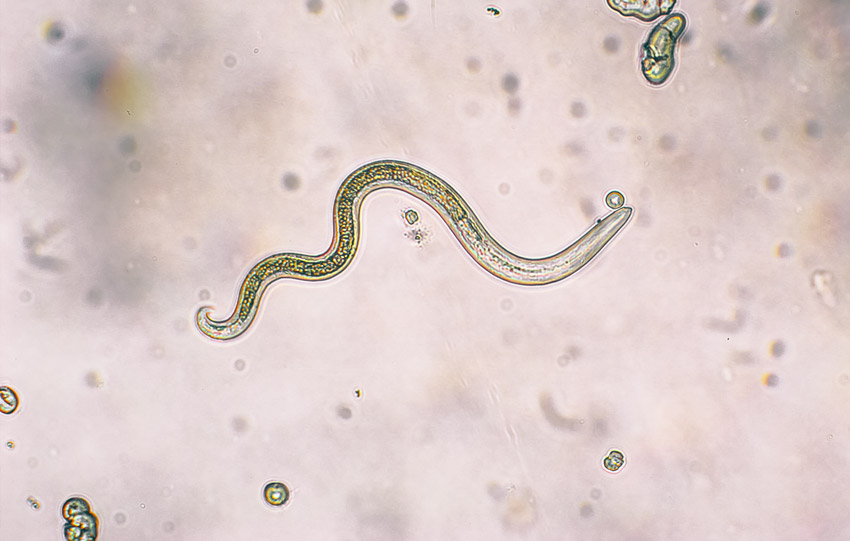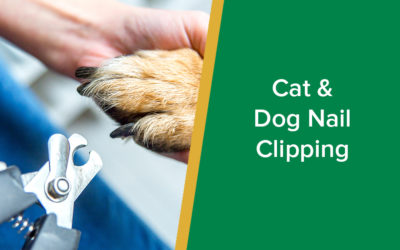Because these worms are different, it takes different drugs to kill them. Most wormers contain a combination of safe drugs which does this. Be aware that some pet-shop wormers only kill one type of dog or cat worm and not both tapeworms and roundworms. The roundworm, Toxocara is the reason you always worm pups every 2 weeks from 2-3 weeks of age. Many pet-shop products still use an old product (check and see), to which many worms are now resistant. De-worming is NOT expensive. We always advise you at the time we see pups for their first check – which are free at Parkside.

When should my dog be dewormed?
Adult dogs should ideally be dewormed every season, but certainly 3 times per year. These wormers are included in our Premier Pet Club, as well as monthly flea protection, annual vaccinations and more! See more HERE. If you have a young dog who eats his or other motions (some do for a while!), then deworm every MONTH.
Adult dogs and cats receive ONE dose of wormer from us which kills ALL types of worms which a dog or cat might carry – we use a tablet which kills all types of worms in one dose. A complete wormer is now available for cats as a spot-on liquid – very easy to administer, on the back of the neck, where it absorbs through the skin – and very safe! An even newer one will also kill fleas and ticks in cats at the same time – we’ve been looking for this for a long time!
You can buy wormers at any surgery – no need to see your pet, just call in and remember that our Drontal tablets are even cheaper than Pets at Home prices – see our price comparison at each surgery.
How to protect your dog from worm infections?
Remember that good hygiene is the best way to protect yourself and your pets from worm infections – encourage children to wash their hands after playing with animals, especially when they’ve been outside, and also clean up after your pets. Parkside promotes responsible pet-ownership and strongly recommends that you pick up faeces as soon as they have been passed, especially in public areas. Bags are freely available at all surgeries, for the Dundee area, courtesy of Dundee City council.
If you need to be reminded to deworm your dog or cat, update your mobile number when you buy your next wormer at a Parkside surgery and thereafter you will receive a text when the next dose is due!
Worm types
Have a look at the different worm types on Bayer’s No-Worm web-site
Roundworms are named because their cross-section is round. (Tapeworms are flat, like tape!)
Roundworms are picked up accidentally by ingesting eggs, passed out by the worms in dogs’ and cats’ faeces. They are ubiquitous (can be found in soil all around us) and as a result they are frequently picked up, but you don’t know as they only pass eggs and you do not see worms. This is why you must deworm as a routine – we recommend 3 times yearly
Tapeworms have a 2-host cycle – egg is eaten by the intermediate host and a cyst forms in the muscle of that host, then the “prime” host has to eat (or eat part of) the intermediate host, then the cyst grows into a long tapeworm. You will see most of these on faeces or on hair around a dog or cat’s bottom, but some are too small and you will miss them. Mice and fleas can infect cats while rabbit and dead sheep are commonest for infecting dogs. Pets can’t get worms from cooked food or pet foods. Uusally picked when hunting or eating something horrible when out walking!
So we recomment using a wormer that kills ALL types of worms as you can never be sure. Look how good value our Drontal is!
Cats can have the luxury of a complete wormer in liquid form, applied to the back of the neck – easy! We also have a preparation which kills fleas and ticks as well. We can’t name it as it is a prescription product, so please call for details.
Read all about parasites in general with David Bellamy, on the Bayer web site, HERE


